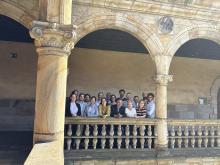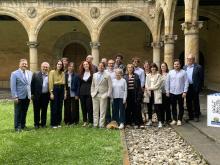Coordinators: Antonio Cardesa-Salzmann (Strathclyde Law School, University of Strathclyde), Mara Ntona (Lecturer in Environmental and Human Rights Law, University of Strathclyde), Laura Huici Sancho (Profesora Titular de Derecho Internacional Público, Universitat de Barcelona), Milagros Álvarez Verdugo (Profesora Titular de Derecho Internacional Público, Universitat de Barcelona)
Description of the meeting
Tourism is a world-wide burgeoning economic sector with major implications for sustainability. However, legal scholarship has paid little attention to its impacts on social institutions, processes and practices across scales and time. The proposed workshop aims at addressing this gap, exploring the effects of different types of tourism on host societies. It will take critical, comparative, and socio-legal approaches, and explore a collaborative research agenda on sustainable tourism from the perspective of legal sociology.
The workshop follows a roundtable methodology. In each panel, a discussion paper (circulated in advance) opens the debate and paves the way for discussions with invited experts, which feature geographers, legal anthropologists, socio-legal academics, and international law experts. The workshop is also open to the participation of stakeholders, decision-makers, and members of the Basque civil society. This format will provide inclusive, multidisciplinary deliberations, thematising issues of equity and sustainability across modalities of tourism, in settings such as the Basque Country, Scotland, France, and Namibia.
Panel 1 will thematise how competing visions of tourism and sustainability shape conflicts between hegemonic and subaltern societal projects across the world. It will outline a tentative framework for critical, comparative, and socio-legal studies of the tensions between tourism and the sustainable reproduction of societies.
Thereafter, discussions will shift towards legal strategies for the sustainability of tourism. These range from the enhancement of human rights (right to the environment, social rights or right to rest), to participatory frameworks that consider local populations’ needs and wills for sustainable tourism. Papers will address intersections between normative orders, ranging from the local to the global levels, taking critical and comparative perspectives. Panel 2 will propose a framework of socio-legal analysis for compared models of regulation in domestic and European jurisdictions. Panel 3 will discuss public-private partnerships and systemic integration across international regimes.
Panel 4 finally turns towards pluralistic, socio-legal frameworks for the appraisal of tourism and sustainable societies. It will navigate human and posthuman ontologies of tourism and the role of rights-based approaches in promoting the sustainable operation of related activities. It will garner preliminary lessons for the regulation and governance of tourism across spatial and temporal scales, laying additional foundations for future socio-legal research.
Our experience in Oñati
On 5 and 6 June 2025, the workshop ‘Tourism and Sustainability? Toward a new socio-legal research agenda’ was held at the International Institute for the Sociology of Law in Oñati. This event brought together 18 researchers from 8 higher education and research institutions. The original idea to apply for a workshop at the IISL came from a collaboration between Prof. Dr Milagros Alvarez-Verdugo and Prof. Dr. Laura Huici Sancho, from the University of Barcelona, and Dr Antonio Cardesa-Salzmann and Dr Mara Ntona, from the University of Strathclyde, within the ILSSToGo research project (International Legal System for Sustainable Tourism Governance), funded by the Spanish State Research Agency.
During the workshop, we unpacked the problematic relationship between tourism and sustainability, together with the notion of ‘sustainable tourism’, two issue areas that are frequently overlooked in political debates. Over the two very intense working days, we discussed the scope and content of these notions through multiple lenses (legal, economic, sociological and anthropological) and perspectives (doctrinal, critical, and socio-legal). Panels harnessed papers and debates addressing four broad themes: (1) spaces in which tourism impacts host societies, leading to conflicts and issues of sustainability; (2) multilevel and polycentric governance of tourism destinations; (3) public-private partnerships in regulatory approaches to the governance of the tourism sector; and (4) alternative and experimental models of governance of tourism, exploring human rights-based and post-human approaches.
The Institute and its amazing team, led by Maite Elorza Plazaola, Malen Gordoa, and Leire Kortabarria, have provided a welcoming and inspiring atmosphere for our workshop. As organisers of the workshop, we are very grateful to them! Last but not least, the location of the Institute in the historic town of Oñati, in midst of the Basque green landscape, only reinforces the inspirational setting. We hope this to be only the first, of hopefully more, workshops at the Institute. Antonio, Laura, Mara, and Milagros.


